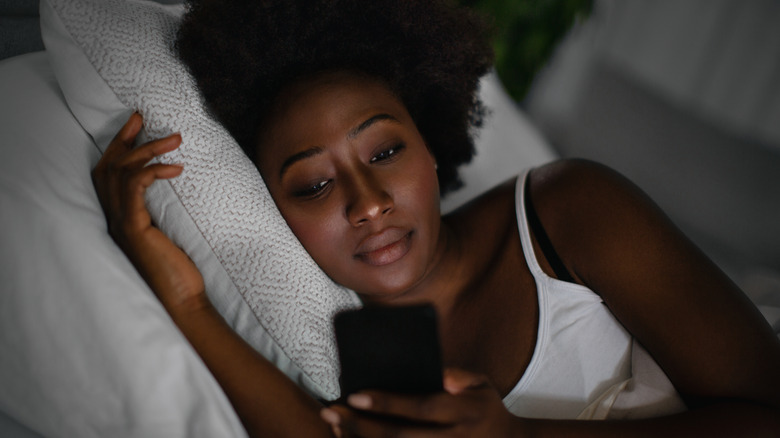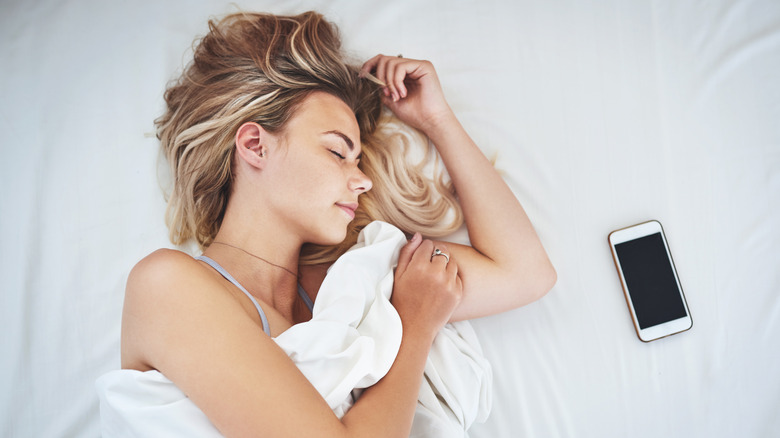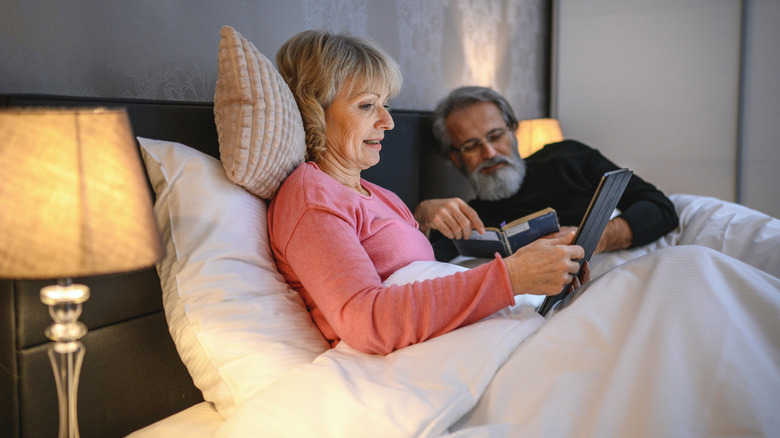Why You Should Consider Putting Your Phone On 'Do Not Disturb' At Bedtime
It can be difficult for many of us to get a good night's sleep on a regular basis. At least seven hours of sleep is suggested for proper health, and having poor sleeping habits can cause a lot of harm to our bodies, even if we don't realize it. Those of us who do get enough sleep may find that it has a positive impact on our lives. Proper sleep can help to balance our hormones and give us more motivation to exercise (via WebMD).
Sleeping is also great for our brain health. Improved sleeping habits can enhance focus and productivity which can lead to better work performance and promote concentration in our daily lives. Being well-rested can also help combat diabetes and heart disease while supporting our immune system, according to the Office of Disease Prevention and Health Promotion. Poor sleeping habits may also lead to panic disorders, anxiety, and depression — especially in the case of extreme lack of sleep such as insomnia. This is why focusing on your sleep health is important, and one major way to get better sleep is by putting your phone down before bed.
Putting your phone on 'do not disturb' may be the best thing for your sleep
There's so much temptation to pick up our phones and scroll through social media before falling asleep. However, this can be one of the worst things for our sleep health. Phones can be a huge distraction from sleep and even aid in poor sleep quality once we finally drift off. This is why experts suggest putting phones on "do not disturb" or airplane mode before bed.
"Putting our phones on Do Not Disturb, or turning them off completely, can sometimes make us feel we are missing out. However, doing so allows us to stop missing out on our own real-world life after the day slows down, especially when we go to sleep," says sleep coach Tracy Hannigan (via Glamour). "The benefits of putting your phone on DND at night include a reduced temptation to check the phone for notifications, which leads to less light intrusion which can affect melatonin production — but especially a reduction in mental stimulation," Hannigan adds.
However, it may be a good idea to put our phones on "do not disturb" for up to two hours before bed. This can allow our brains a break from the screen so they can shut down and get the healthy sleep our bodies crave. Meanwhile, if "do not disturb" mode isn't an option for you and you're afraid you'll miss an important call or text, there are other ways to reduce screen time before bed.
Other ways to limit screen time before sleep
If you can't bring yourself to put your phone on "do not disturb" mode while you sleep, there are other ways to help you avoid screen time before bed. One of the easiest ways to avoid reaching for your phone is to move it to another room. This will allow you to hear the phone if an emergency call or text comes through, but will keep it out of sight and reach in order to avoid late-night scrolling. This is also a helpful trick if you have trouble getting up in the morning.
There are also apps that will block the use of social media during scheduled hours, and allow you to put the phone down and do something else, such as picking up a book to read before laying down for the night. Blocking the internet from your devices before bed can also be done if you don't trust yourself enough to leave the phone behind when it's time to rest. Listening to a podcast while falling asleep instead of watching TV or videos can also be helpful. You may even choose to start meditating as a way to wind down. If you want to scroll through your device though, consider using night mode on your phone or wearing blue light-blocking glass that will take it easy on your eyes and provide less stimulation before falling asleep.
If you're having trouble sleeping, consider ditching the phone at night and you'll likely find yourself reaping the benefits of better rest.


